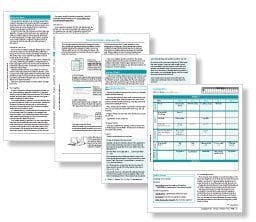The Sonlight Commitment
Giving to Christian Missions Organizations
From our inception, Sonlight Curriculum, Ltd. has donated a minimum of 10% of gross income to missions organizations, and since 2005 we have been able to increase our missions giving to more than 50% of company profits. Watch the video and read this open letter from Sarita Holzmann, co-founder and President of Sonlight, to discover the heart behind Sonlight's commitment to give.
Dear Homeschool Friend,
I'd like to take a minute to step back and look at the big picture of why Sonlight is in business.
When John and I first started Sonlight back in 1990, we were on staff at the U.S. Center for World Mission (USCWM). We were then, and still are, now, concerned about the international Christian missions movement. We want to see the Good News of Jesus Christ made known throughout the world, the Good News of a God Who loves us (the only god who makes this claim)—a God Who loves us so much that He gave His own Son to die for us.
At the time my friend Becky Lewis and I were first thinking about the concept of Sonlight, I said that my purpose in starting Sonlight was "to enable missionary families to stay one more year on the field."
You see, the first most common reason missionaries return home is because they can't get along with other missionaries. I figured I couldn't do anything about that.
But the second most common reason—at least back in 1990—was because they didn't know what to do about their children's education. And I thought I could do something about that.
So that's a bit about how and why we started Sonlight.
But now Sonlight is well established. And it's making money. It's profitable.
So here's a question. And I thought you might like to know the answer:
What does Sonlight do with its profits?
After we pay our employees a fair market wage plus benefits; after we pay our bills "on time at the latest" (a moral principle for us—we don't string out suppliers); and after we cover our taxes; we seek to donate as much of our profits to missions as possible. Of course, we have to reserve some profits for future projects. If we retained no profits in the company, Sonlight would be unable to grow and increase its impact.
I would like to talk about the missions giving since, obviously, that is where the majority of our profits go.
A little history
While at the USCWM, John and I learned that 95 cents of every dollar donated to Christian causes here in the United States stays in the United States. And, of the 5 cents that goes outside the U.S., 90 percent of that (or 4.5 cents) goes to meeting the needs of people groups that already have a viable indigenous church movement (for example, to mission efforts in Mexico and Guatemala—where the church already exists ... and thrives). Only half a penny of every dollar donated to Christian causes in the U.S. goes to the billions of people who live in the ethnic groups that have no viable, indigenous, reproducing church movement among them.
It was with these statistics in mind that John and I decided, after giving our tithe to our local church, we would focus the rest of our giving on reaching out to and ministering to the needs of these under-funded unreached groups.
We remember the unreached groups by the acronym, THUMB: Tribal peoples; Hindus; Unreligious Chinese; Muslims; Buddhists.
If you look at a map of the world, the majority of these peoples live in countries that have much of their land mass in an area that stretches from 10 to 40 degrees north of the equator—from western Africa to southeast Asia. International missions leaders call this area the 10-40 Window.
The 10-40 Window is not only the part of the world that has the fewest Christians and fewest indigenous church movements, it is also, by almost every measure, the world's physically neediest as well. The people there experience more poverty, more misery, more suffering, the highest death rates (though, with the current global HIV/AIDS crisis, possibly eclipsed by sub-Saharan Africa), the lowest literacy ... the needs are overwhelming.
And yet the 10-40 Window is where the least amount of American giving goes.
About eight years ago, I realized John and I were so busy, we never read most of the missionary support appeals letters that came our way. In fact, at the end of the year, we always had about two boxes—the size of paper cartons—filled with unopened missions agencies' appeals letters. We had given $25 once to some agency, and then they would send us monthly appeal letters, hoping we'd give them more money...
I realized this was really bad stewardship. These agencies were spending more on letters to us than we had even given them in the first place.
So for that, and a number of other reasons, I suggested to John that we should focus our giving. To which he readily agreed.
But how should we do that?
1) We realized we were not focused on the very things—the unreached peoples, the world's most needy—that we were especially aware of as a result of our involvement at the U.S. Center for World Mission! We decided to change that habit. We would focus on the unreached peoples.
2) We would choose just five agencies to support—one for each of the five major blocs of unreached peoples (THUMB).
Focused giving to unreached peoples
As it turned out, we found four agencies that could serve as proxies for the five megagroups of unreached peoples. And so...
Though they don't only serve the specific groups for which we consider them proxies, we currently support:

The SEED Company as a proxy for tribal Groups
The Seed Company (TSC) is a daughter organization of Wycliffe Bible Translators that works through native speakers to translate the New Testament for people groups who do not have God's Word in their heart language. The vast majority of people groups who still need Bible translation are Tribal peoples. Among the 300+ people groups where they are currently working, TSC partners with local ministries—churches and evangelistic organizations, community development and educational organizations, etc.—to ensure that the translated Scriptures have immediate impact in the community.

Mission India as a proxy for Hindus.
With over 1.2 billion people of diverse castes, languages and backgrounds, India is home to more unreached people groups than any other nation. Mission India employs a three-fold model to reach this predominantly Hindu nation with Christ's love. Intensive literacy courses teach adults to read (using reading materials from the Bible) while helping them gain basic life skills and income-generating skills. About 80% of all the people who begin these classes actually finish, and about a third of these graduates become heartfelt followers of Christ as a result. Children's Bible Clubs throughout the country reach over 5.5 million children a year. A rigorous one-year program also trains church-planters. While completing this course, these evangelists have a goal of planting at least two new churches in villages where there currently is not a Christian church.

Far East Broadcasting as a proxy for Unreligious Chinese.
Far East Broadcasting is a radio ministry that works with indigenous speakers to beam the message of good hope to the peoples of Asia. Through radio, they reach into places that lack a strong Christian presence in order to spread the Gospel to those who have never heard and encourage believers who lack the support of a vibrant Christian community.

Frontiers as a proxy for Muslims.
Frontiers is the only evangelical agency focused solely on reaching the Muslim world. Frontiers' passion is to glorify God by seeing new, reproducing communities of Christ-followers lead to movements among all Muslim peoples. The Frontiers U.S. Sending Base (which we support) recruits, trains, sends and serves Americans who go to work and serve among Muslim people groups around the world.
Far East Broadcasting as a proxy for Buddhists.
See the description of this organization under Unreligious Chinese above.
We count it a great joy to send a significant portion of Sonlight's profits to share the Good News and change our world.
Sincerely,
Sarita
Current Giving Opportunities
Sonlight invites you to not only learn about how the gospel makes a difference around the world, but how you and your family can help change the world. Discover our current and past missions educational fundraising opportunities here.
Please Note: Sonlight funds its missions giving through profits earned from the sale of its products and services. Your purchase of products and services from Sonlight does help us continue to support many great ministries and efforts, but does not constitute missions giving.

REQUEST A FREE CATALOG
Find your ideal homeschool curriculum in the pages of Sonlight's free catalog. Browse Sonlight's award-winning literature-based curriculum and academically excellent products in all subjects—for all grades.

